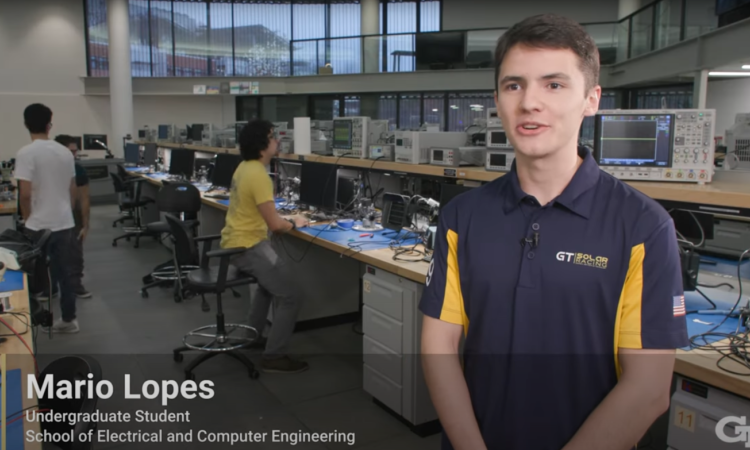
As we reflect on the year, it's clear that virtually every aspect of research and learning will now be enriched by AI.
Arijit Raychowdhury, the Steve W. Chaddick School Chair of the School of Electrical and Computer Engineering
The incredible potential of artificial intelligence (AI) and machine learning (ML) became widely known to the world in 2023. From a modest understanding to seamless integration into everyday language, the year marked a milestone, reminiscent of the early internet era.
The Georgia Tech School of Electrical and Computer Engineering (ECE) played a distinctive role in this journey, positioned at the heart of the technology and its relationship to humans. Physical objects that sense, collect data, compute, make decisions, move, and perform actuation are all becoming more intelligent. Meanwhile, human interactions with AI — from end users to data scientists, experts, decision makers, and policy creators — is only increasing.
“Engineering is where AI meets the world and electrical and computer engineering is exactly at the forefront," said Arijit Raychowdhury, Steve W. Chaddick School Chair and professor. "As we reflect on the year, it's clear that virtually every aspect of research and learning will now be enriched by AI.”
As we enter 2024, poised for another year shaped by the force of AI, let's look back at just a few of the notable AI and ML milestones that took place in ECE this year.
JUMP 2.0: Looking to the AI Future
In early 2023, the Semiconductor Research Corporation (SRC) and the Defense Advanced Research Projects Agency (DARPA) awarded Georgia Tech $65.7 million to lead two Joint University Microelectronics Program 2.0, or JUMP 2.0 centers.
The JUMP 2.0 program looks to U.S. universities for collaborative, multidisciplinary, multi-institute research in seven theme areas that aim to improve the nation’s information and technology infrastructure. Many theme areas are concentrated on developing essential semiconductor technology crucial for advancing the future of AI.
The Georgia Tech-led centers, CoCoSys: Center for the Co-Design of Cognitive Systems and CogniSense: Center on Cognitive Multispectral Sensors, are both housed in ECE and led by faculty members Arijit Raychowdhury and Saibal Mukhopadhyay.
Both centers have wide-ranging focuses to research the crucial components necessary to construct intelligent machines that excel in efficiency and effectiveness when collaborating with humans in real-world scenarios.
“In humans, sensors and the brain work together to control attention and extract only important information from everything happening around us,” said Mukhopadyay. “We have a diverse team with expertise in radars, optics, integrated circuits, packaging, signal processing, and artificial intelligence to build these new sensors with a brain."
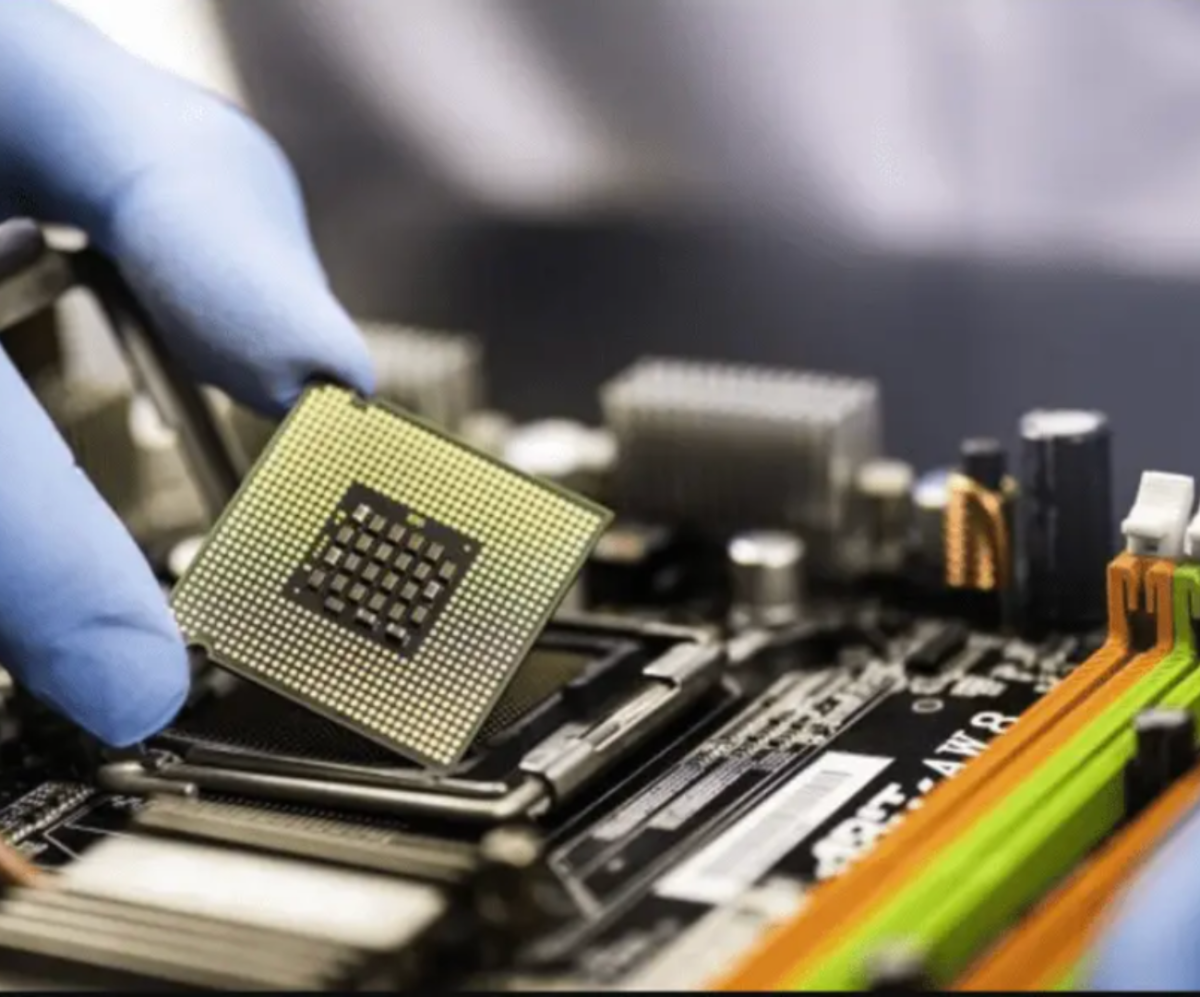
Establishing the new JUMP 2.0 research centers is the result of impeccable timing, according to Raychowdhury, who pointed to ECE's top rankings and the CHIPS and Science Act, which provides about $280 billion in new funding to boost U.S. research and manufacturing of semiconductors.
(text and background only visible when logged in)
ECE Adds AI Experts to Faculty
ECE has continued to strategically prioritize AI and ML within its faculty, further positioning the School as a leader in emerging research opportunities. The approach also aligns with the increasing demand from students and industry alike, seeking to cultivate a skilled and technically proficient engineering workforce.
Within the domain of AI-driven research, these new faculty members are tackling diverse societal challenges such as sustainability, affordable pharmaceuticals, and enhancing transparency in machine learning.
This year, the School welcomed Pan Li and Divya Mahajan to the faculty. Li is working to develop and analyze more expressive, generalizable, and robust machine learning algorithms, specifically those dealing with graph and geometric data. While Mahajan, who holds a joint appointment in the School of Computer Science (SCS), is devising next-generation sustainable computing platforms focused on constructing deep learning infrastructure while minimizing the associated carbon footprint.
“Georgia Tech offers a highly cross-disciplinary environment,” said Mahajan. “ECE and SCS both foster a strong collaborative atmosphere. Another very important strength of ours is that students and faculty here are highly motivated, collaborative, and, most importantly, dedicated to the success of each other.”
Li and Mahajan are in addition to AI and ML experts like Amirali Mohandesi (specializing in AI for the sciences), Vidya Muthukumar (focused on machine learning theory), and Ashwin Pananjady (specializing in statistical machine learning), who all joined the faculty relatively recently.
Heck Co-leading AI Hub at Georgia Tech
In June, the Institute announced the AI Hub at Georgia Tech, aiming to unite campus-wide AI initiatives. The initiative seeks to foster collaboration, allowing the Institute to collectively strive towards becoming a global authority in AI. Additionally, it will play a pivotal role in advancing AI education and steering research and development efforts towards practical, ethically sound applications.
Larry Heck, a professor with a joint appointment in ECE and the School of Interactive Computing, will co-lead the interdisciplinary initiative alongside Irfan Essa, the senior associate dean of the College of Computing. Together, they will look to develop new paths in educating and training the next generation of the AI workforce.
“Georgia Tech is well positioned to pursue meaningful opportunities in AI by focusing our collective capabilities across campus, not only in AI research, but also in the integration and application of AI solutions,” said Heck.
AI Hub at Georgia Tech will also serve as a dedicated space for decision makers and other stakeholders to access best-in-class resources to guide them through the complexities of commercializing and deploying AI.
Diverse AI Research Continues
While AI made its mainstream splash this year, ECE has been committed to researching and advancing AI technologies for years. This dedication has only grown stronger, evident by the notable research accomplishments of 2023.
Many faculty members and students presented cutting-edge AI-related work at leading conferences and symposiums like the International Symposium on Computer Architecture, the Conference on Neural Information Processing Systems, the International Conference on Intelligent Robots and Systems, the International Conference on Computer Vision, and many more.
Students garnered attention for their groundbreaking research, including Ph.D. candidates Payman Behnam (ECE) and Jianming Tong (SCS), who received a Qualcomm Innovation Fellowship for enhancing responsiveness and efficiency in running machine learning models. Another standout, Ph.D. candidate Zishen Wan, was selected as a 2023 Machine Learning and Systems Rising Star for developing scalable design methodology for autonomous machine computing.
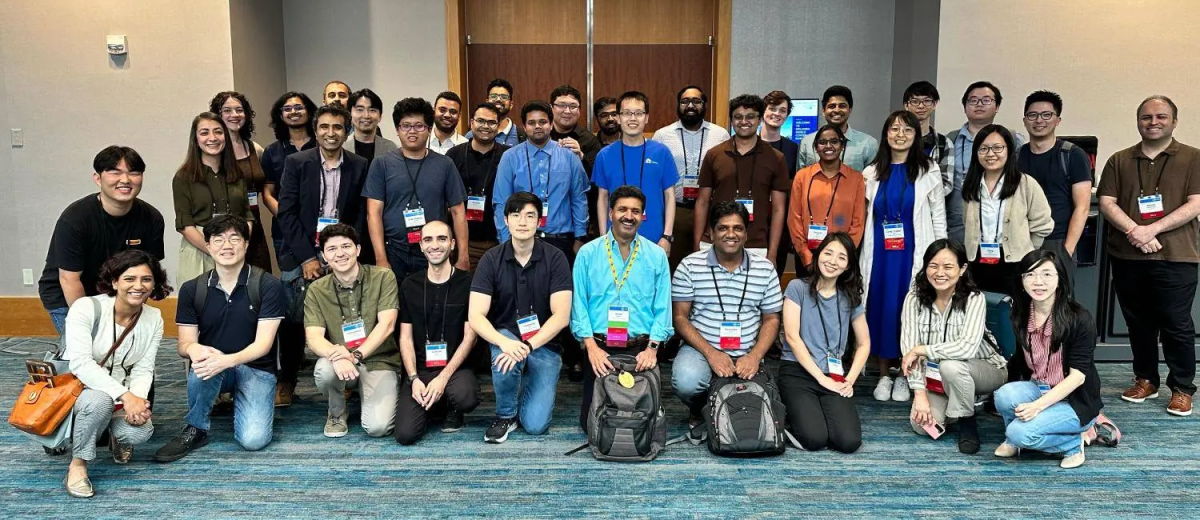
The Georgia Tech team at this year's International Symposium on Computer Architecture (ISCA).
Faculty members Vidya Muthukumar and Pan Li received National Science Foundation (NSF) Faculty Early Career Development Program (CAREER) awards for foundational machine learning research and machine learning in graph data, respectively.
ECE was also a hotbed for machine visual learning research, with Ghassan AlRegib's research group receiving best paper recognition from the European Association For Signal Processing. Their work explored various methods to enhance action recognition in videos using deep neural networks.
Among other notable advancements were Chris Rozell's exploration into deep brain stimulation and AI, Callie Hao's recognition as an Intel Rising Star Faculty awardee for her contributions to hardware machine learning, Sung Kyu Lim's work with Synopsys on enhancing digital circuit performance through a reinforcement learning agent, and a joint effort between ECE researchers and Samsung to reduce voltage in current digital storage technology, unlocking the untapped potential of AI systems.
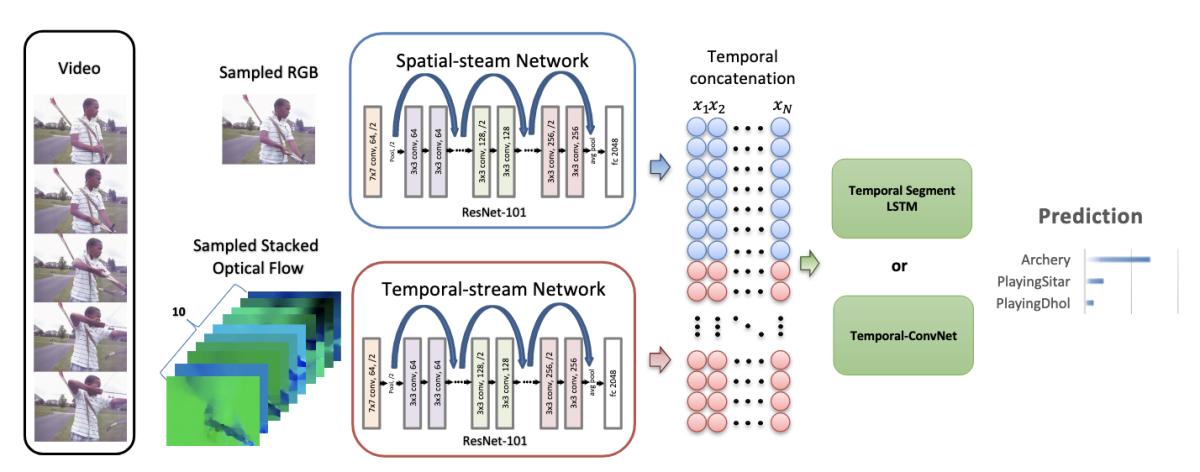
Overview graphic of Prof. Ghassan AlRegib’s research group’s proposed framework to improve action recognition in videos using deep neural networks.
Expanded AI and ML Curriculum Opportunities
Electrical and computer engineering plays a vital role in shaping AI's interaction with the physical world. The School's approach to AI and ML engineering education looks to prioritize practical real-world problem-solving, while fostering a creative mindset in that can keep up with the rapid pace of change.
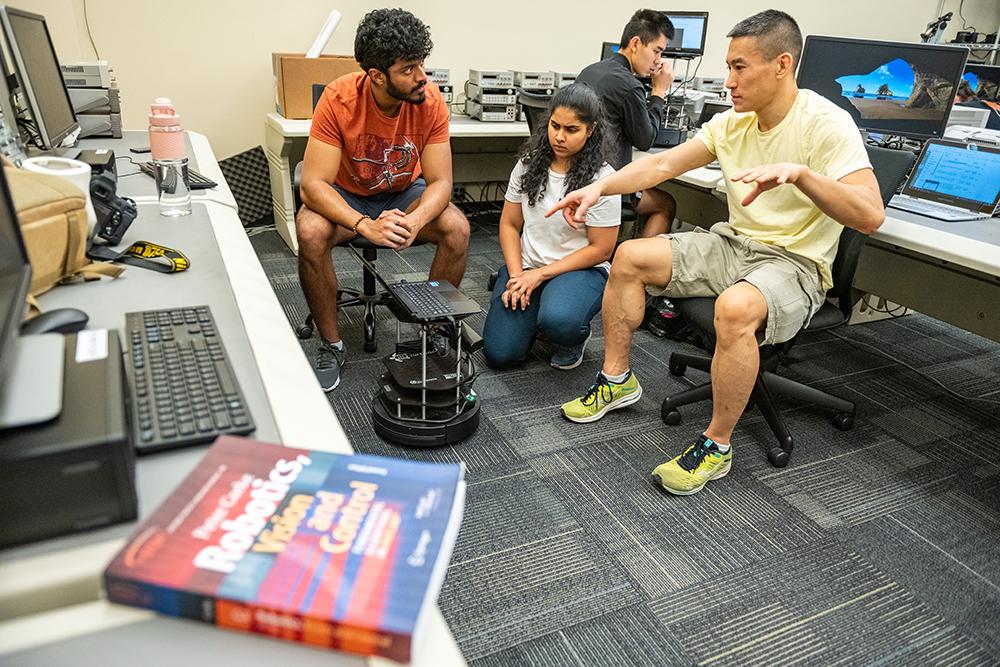
ECE students collaborating on a computer vision and control project.
In 2023, the School continued to strategically integrate, emphasize, and advance the topics within existing and new courses. Recent noteworthy additions to the curriculum include ECE 3251: Optimization for Information Systems, ECE 4252: Fundamentals of Machine Learning, and ECE 4802: Digital Image Processing.
ECE is also actively working on a comprehensive course to establish AI literacy for all Georgia Tech students. Beyond imparting fundamental AI knowledge, the course will offer practical exposure to algorithm design, data structures, logical reasoning, and AI systems. Emphasis will also be given to examining the societal and ethical impacts of AI systems.
“We genuinely look to our students to influence the direction in which AI will redefine reality at a societal level,” said Raychowdhury. “It’s an exciting time in ECE with more developments to be announced in 2024.”
(text and background only visible when logged in)
Related Articles
2022-2023 ECE Annual Report
Learn more about ECE's achievements, innovations, and the strides made in shaping the future of electrical and computer engineering education and research.
(text and background only visible when logged in)
All Industries Want an ECE Major
VIDEO: Hear directly from students about what it's like to attend the Georgia Tech School of Electrical and Computer Engineering (ECE) and discover what led students to pursue an electrical or computer engineering degree.
(text and background only visible when logged in)




